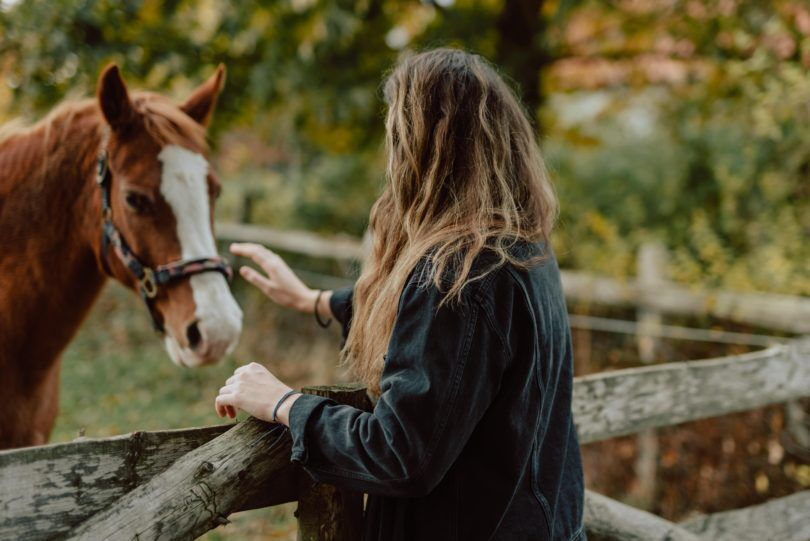It’s easy to think that horses are mind readers.
After all, they’re intuitive partners in many therapy programs. They become nervous when a rider is anxious about crossing a bridge on the trail. Plus, their big, soulful eyes seem to look right through you.
You may have also heard comments like: “Horses can smell fear,” or “If you act nervous, he’ll get scared, too.” But, horses are not telepathic. They are, however, very observant.
Books and movies have pervaded the idea that horses can sense fear and anxiety. There’s usually some wise cowboy type who offers advice to the hero along the lines of: “Don’t let old Flame know you’re scared, and you’ll be okay!”
That’s all fine and well if you’re watching a fun flick, but it can also lead anxious riders in real life to stress and to the question: “But I AM nervous? How do I hide it from this giant beast I’m about to get on?”
The truth about “horse powers”
Okay, first the facts. Your horse cannot read your mind. He doesn’t have a crystal ball hidden under the shavings in the corner of his stall. Whew!
Horses are extremely observant and in-tune with their surroundings, though. They have to be.
They aren’t telepathic, but they do notice a LOT.
They’ve evolved to believe that there’s danger out there in the world 24/7/365, and that it’s safest to avoid predators by staying in herds, where the other horses will help keep them safe. As prey animals being alert to everyone and everything else around them is critical to horses’ survival.
Even modern horses, who are quite unlikely to be eaten by tigers like might have, still have these basic instincts.
They pay attention to their environment all the time. And, by the time they’re trained to ride, horses become experts at “reading” people.
They notice if someone working around them is not following the usual routine, becomes tight and tense in the saddle, or acts stiff on the ground. They observe, process information, and ask “Am I safe?” every moment of every day.
See tangible ways to boost your confidence and overcoming fear with our list of 32 things you can do today to calm your riding nerves forever.
What does that mean for me, the nervous one?
OK, great. My horse can’t read my mind. But, he sure knows if I’m acting scared and will wonder if he needs to have a panic attack, too.
Are nerves the end of your riding career? Heck no!
Changes in routine can feel threatening.
Horses simply want their lives to go on as calmly and normally as possible. That means following the routines they’re used to, moving around them calmly, and assuring them that they are safe.
And guess what? The more you focus on reassuring your horse that everything is fine, the more likely you are to start believing it yourself. #winwin
Listen to your coach or riding instructor, and do your best to follow your horse’s normal routine. This will convey to your horse that you’re not a threat, that you don’t want to shake up their life by doing anything scary, and that you are familiar with their preferences.
That could mean adjusting how you approach your horse in the field, where you tack up, and how you use your leg and rein aids in the saddle.
Set the right tone by working with your horse on the ground in safe and consistent ways (e.g. speak softly so they know where you are moving around them). If you’re not sure what your horse’s preferences are, ask your riding instructor or barn manager.
If you keep your horse at home, spend more time with your horse and try different approaches. Your steed will be clear about what he does and doesn’t like!
Butterflies in your stomach? Learn how to get your mojo back when you’re scared to ride your horse.
Learn to speak horse
One of the best ways to feel more confident around horses is to understand your and how they communicate. Think of it like flying into a foreign country and not speaking the language. You’ll likely feel a bit uneasy, unsure what people are doing and saying, and out of place.
Once you learn the language, though, all the puzzle pieces fall into place. You can move through the country with a higher level of confidence and calm.
Remember, they’re always paying attention to each other and their surroundings.
Horses use body language to express their feelings.
To learn more about how a nervous horse acts, watch the video below:
[youtube https://www.youtube.com/watch?v=t84KDWP6UKA]Be kind to yourself
Everyone has nervous moments around horses, and as long as you’re keeping the routine and pattern familiar for the horse you’re riding, they’ll be okay with your inexperience. So, don’t beat yourself up for feeling fear or anxiety.
The more knowledge you accumulate and time you spend around horses, the more comfortable you’ll become.
Keep breathing, keep smiling, and keep your gaze between those fuzzy ears. It’s going to be a great ride!
P.S. Enjoy this article? Trot on over to:
- 32 Things you can do today to calm your riding nerves forever
- Scared to ride your horse? Get your mojo back
- How can I calm my nerves before horse riding?
- What are some ways to gain confidence riding horses
- Safe or sorry: how often to replace horseback riding helmets
- Get your asana in the saddle: 5 yoga tips for equestrians

